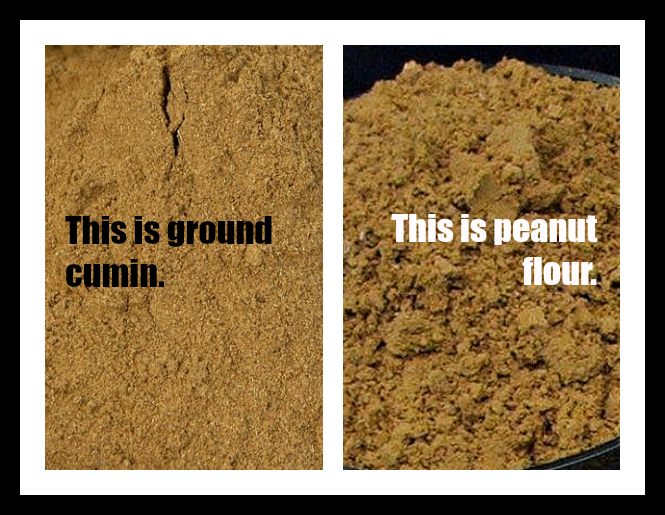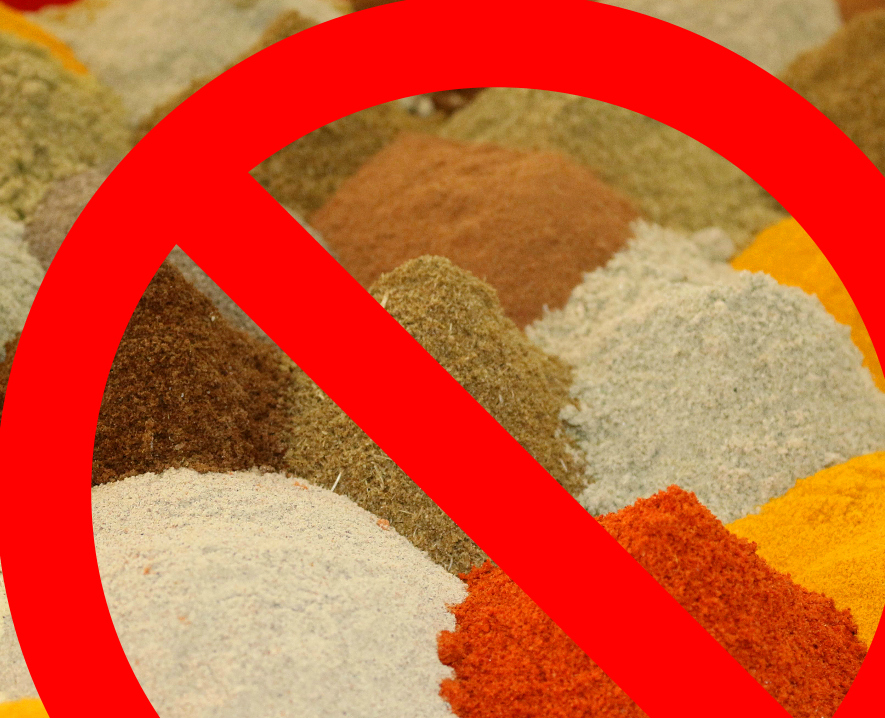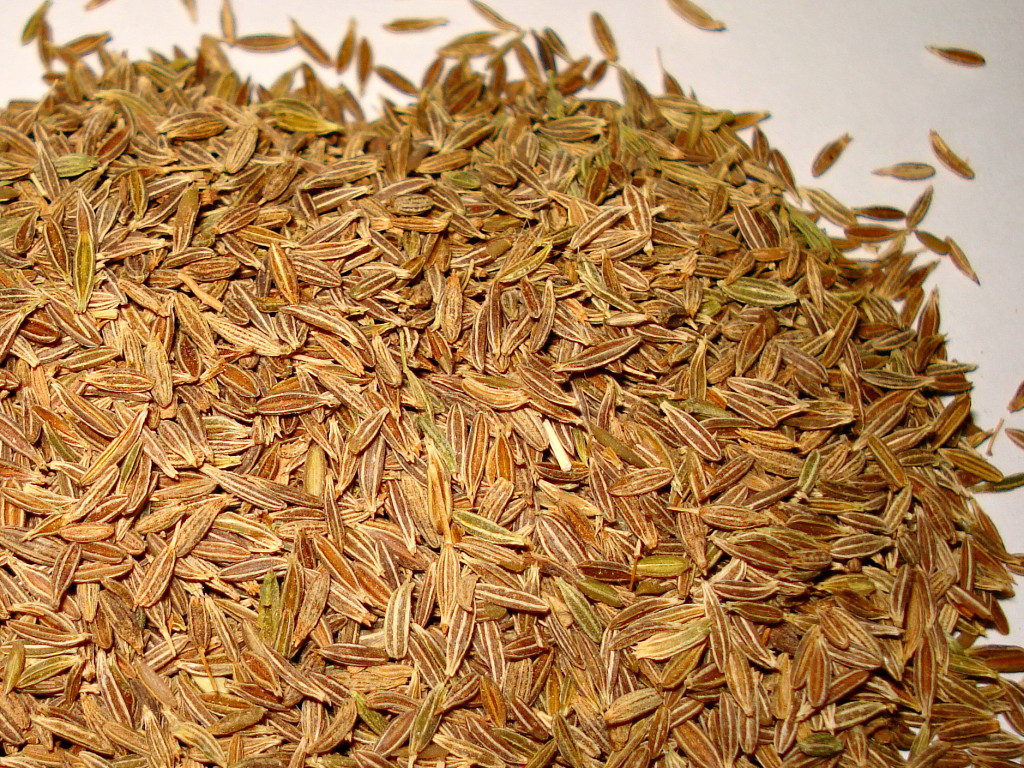
Totally easy to tell apart, right? I’m sure no one would ever mix these up.
On October 30th, 2014, the parent company of the brand Ortega in Canada, B.H. Foods, announced a recall, in cooperation with the Canadian Food Inspection Agency, of a single lot of Ortega Taco Seasoning Mix in the 35.4 grams size, with a best by date of May 8, 2016.
The recall notice read, “B.H. Kosher Select Food Dist. is recalling Ortega brand Taco Seasoning Mix from the marketplace because it contains peanut and almond which are not declared on the label. People with an allergy to peanut or almond should not consume the recalled product described below.”
Curiously, the next day, October 31st, a different Canadian company, Universal Impex of Canada, also announced a recall of a different spice product– Cool Runnings Jamaican Style Curry Powder. Different company. Different spice mix. But the recall language was strikingly similar: “Universal Impex Corp. is recalling Cool Runnings brand Jamaican Style Curry Powder from the marketplace because it may contain peanut and almond which are not declared on the label. People with an allergy to peanut or almond should not consume the recalled product described below.”
On November 11th, B.H. Foods expanded its recall of Ortega branded products in Canada to include a second lot of Taco Seasoning Mix, with a best by date of June 26, 2016.
On November 14th, B.H. announced through the CFIA that its recall for undeclared peanut and almond ingredients had expanded to include multiple lots of 29 different products under the Ortega and Las Palmas brand including taco seasoning mix, taco sauce, taco dinner kits, commercial taco seasoning spice for restaurants, and more. B&G Foods, the name for Ortega’s parent company in the United States, simultaneously announced a recall through the U.S. Food and Drug Administration that included a similarly long list of Ortega and Las Palmas products including taco spice mix, taco kits, enchilada sauce, hot sauce packets and more.
The FDA recall page read, in part, “B&G Foods announced today it is voluntarily recalling certain Ortega Taco Seasoning Mix, Ortega Taco Sauce, Ortega Enchilada Sauce and Ortega Taco Kit products and certain Las Palmas Taco Seasoning Mix and Las Palmas Taco Sauce products after learning that one or more of the spice ingredients purchased from a third party supplier contain peanuts and almonds, allergens that are not declared on the products’ ingredient statements.”
On November 20th and again on November 28th, Universal Impex of Canada expanded their recall to include more curry products.
On December 19th, Reily Foods issued a recall through the U.S. FDA of its Carroll Shelby and Wick Fowler brand chili seasoning kits, after, according to the recall notice, “learning that one or more of the spice ingredients purchased from a third-party supplier contain peanut and almond allergens that are not declared on the products’ ingredient statements.”
And that’s when I started to get suspicious.
I hear about most U.S. recalls for food products that contain undeclared peanut. “Undeclared” allergen recalls happen in the U.S. when a packaged food product is found to to contain a significant amount of a top 8 food allergen (meaning milk, egg, wheat, soy, shellfish, fish, tree nuts or peanuts) that is not listed on the product’s ingredient label.
As the mother of a child with a life-threatening peanut allergy, I’d better make sure I hear about recalls for undeclared peanut. As little as one 1/100th of one peanut can cause allergic symptoms in a person with a severe peanut allergy, so even trace amounts of peanut that make their way into a food product by accident can cause a problem for my son. Savvy food allergy parents know to sign up for recall alerts from the FDA.
I also get a heads-up on peanut-related recalls from food allergy advocacy organizations like FAACT and FARE. And as a member of No Nuts Moms and a number of other online food allergy support groups for parents of children with food allergies, I am connected to a virtual army of thousands of mothers and fathers who are always on the lookout for food safety issues that might affect children with food allergies.
So thanks to the awesome power of the internet, I’d already heard about the Ortega recalls in Canada and the U.S. I’d missed the Universal Impex recall (since it was in Canada). But when the Reily recall popped up across my news feeds in December, I asked some of my food allergy advocate friends, “Do you think this Reily spice recall could be related to that Ortega spice recall from November?”
No one I asked knew.
The FDA had not publicly announced any connection between them.
And try as I might, I could not find any information on the B&G or Reily websites identifying the “third-party supplier” both companies mentioned as the source of their contaminated product.
On December 26th, Adams Flavors announced a recall of multiple spice products that contained cumin, including single-ingredient cumin packages, chili powder and various spiced meat rubs, saying, “We were notified by one of our third party suppliers that one of the spice ingredients purchased contains peanut proteins, allergens that are not declared on the products’ ingredient statements. People who have an allergy or severe sensitivity to peanuts run the risk of serious or life-threatening allergic reaction if they consume these products.”
That was when I decided it was time to start making a list of spice recalls for undeclared peanut or almond that seemed like they might be related.
My list has gotten very, very long.
Dozens of brands, hundreds of products, and hundreds of thousands of pounds of food long. All of which seem to contain cumin or spice mixes that might contain cumin.
Though perfectly safe for people without any food allergies to consume, any one of these products that have been recalled for undeclared peanut and/or almond protein could potentially kill a person with a life-threatening peanut or tree nut allergy.
Keep in mind that during this entire set of recalls, the FDA, the USDA, and the CFIA have, as far as I know, issued no official public statements linking all of these recalls, nor has any of these agencies issued any general public alert (not related to a specific recall) regarding a nationwide food safety issue with cumin or other spices. The FDA, USDA and the CFIA have not publicly named a potential source for this apparently industry-wide problem. And as far as I know there has also been no national media coverage of these recalls that mentions that they may be related.
The national food safety agencies and national media in the U.S. and Canada aren’t warning the public that the presence of undeclared nuts in cumin could be a systemic, continent-wide food safety emergency for people with allergies to peanuts or almonds. So I am. If you know someone who has a peanut or tree nut allergy or has a child with a peanut or tree nut allergy, please share this post with them and let them know that eating any of these recalled foods may put them in danger.
Here is my list. SO FAR. (I will continue to update this post with new potentially related recalls as I find them.)
October 30th: B.H. Foods (AKA Ortega in Canada) recalls their taco spice mix in Canada. (Mentioned above.)
October 31st: Universal Impex of Canada recalls Cool Runnings brand Jamaican style curry powder. (Mentioned above.)
November 10th: B.H. Foods (AKA Ortega in Canada) expands their taco spice recall in Canada. (Mentioned above.)
November 14th: B.H. Foods (AKA Ortega in Canada) and B&G Foods (AKA Ortega in the U.S.) recall taco spice mix and dozens of related products that contain taco spice mix in both the U.S. and Canada. (Mentioned above.)
November 20th: Universal Impex of Canada expands their recall to include more curry products. (Mentioned above.)
November 28th: Universal Impex of Canada expands their recall to include even more curry products. (Mentioned above.)
December 19th: Reily Foods recalls chili seasoning kits through the FDA. (Mentioned above.)
December 26th: Adams Flavors recalls multiple products that contain cumin, including single-ingredient cumin packages, chili powder and various spiced meat rubs. (Mentioned above.)
December 26th: C.F. Sauer recalls barbeque grill seasoning, chili powder and ground cumin with UPC codes and code dates between June 13 2014 and October 21, 2014. They blame a spice supplier by the name of Schiff Foods and state that Schiff sold them cumin “which could have come into contact with peanuts in the manufacturing environment and could have issues for anyone with peanut allergies.” (As far as I can tell, this recall has ONLY been published to the Sauer site so far, and is not on the FDA site.)
December 27th: Garcia Foods in Texas recalls 190,450 pounds of pork products that were seasoned with spices obtained from Adams Flavors for undeclared peanut, through the U.S. Department of Agriculture; this is publicly linked by both the FDA and USDA to the Adams Flavors recall.
December 29th: Jardine recalls multiple chili spice mix products, stating: “We were notified by one of our third party suppliers that one of the spice ingredients purchased contains peanut proteins, an allergen which is not declared on the products’ ingredient statement.”
December 29th: Hausman Foods in Texas recalls 38,400 pounds of beef and pork products that were seasoned with spices obtained from Adams Flavors for undeclared peanut; this is publicly linked by the FDA and USDA to the Adams recall.
December 29th: J & B Sausage in Texas recalls 45,904 pounds of chicken and beef products that were seasoned with spices obtained from Adams Flavors for undeclared peanut; this is publicly linked by the FDA and USDA to the Adams recall.
December 29th: HEB Meat in Texas recalls 83,666 pounds of pork products that were seasoned with spices obtained from Adams Flavors for undeclared peanut; this is publicly linked by the FDA and USDA to the Adams recall.
December 30th: J & B Sausage expands their recall to include more meat products.
December 31st: Campos Foods of Tennessee recalls 5,300 pounds of chicken products that were seasoned with spices obtained from Adams Flavors for undeclared peanut; this is publicly linked by the FDA and USDA to the Adams recall.
December 31st: Adams Foods expands their recall for undeclared peanut to include multiple flavors of Private Selection brand panko breadcrumbs.
January 2nd: Zilks Foods recalls all flavors of its 8 oz size packages of hummus. Zilks says the hummus ” may contain undeclared peanuts” because “a spice ingredient from a single supplier used in the affected products was contaminated with peanut allergens.”
January 7th: Fresh Food Manufacturing recalls 5,865 pounds of chili products for undeclared peanut. They say they were notified by an unnamed “spice supplier” that “cumin used in the chili may have been contaminated with peanut allergens.”
January 7th: HEB issues a new recall (through the FDA this time not the USDA), this time for soup and chowder products. They say, “H-E-B was notified of this issue on January 5, 2015 by the vendor Southern Style Spices that one of the spice blend ingredient components used in the products had tested positive for peanut residue.”
January 8th: The Daniel Weaver Company recalls 7,092 pounds of Yoruk Halal Beef products, saying the company was “notified by its spice supplier that the cumin in a spice mix used to formulate the sausage may have been contaminated with peanut allergens.” The supplier is not named.
January 9th: Con Yeager Spice Company recalls OVER 100 VARIETIES of cumin and spice mixes that contain cumin, sold nationwide under multiple brand names, including Con Yeager, Shop N Save, Trader Horn, Bi Lo, Burning Asphalt, Country Smokehouse, Ray’s Recipes, and more. Con Yeager says they were “notified by the supplier Morris J. Golombeck Inc. that the ground cumin product had tested positive for traces of peanut protein.”
January 9th: MorningStar Farms recalls Spicy Black Bean veggie burgers and Chipotle Black Bean veggie burgers. MorningStar says, “MorningStar Farms was notified by a third party supplier that one of the spice ingredients used in Spicy Black Bean Burgers and Chipotle Black Bean Burgers may inadvertently contain peanut, an allergen that is not declared on the products’ ingredient statements.”
January 9th: Taj Indian Gourmet recalls three flavors of sauce “due to undeclared peanut allergen in a spice provided by a third-party supplier.”
January 9th: Shirk’s Meats recalls 1,062 pounds of pork sausage products through the USDA, saying, “The problem was discovered when Shirk’s Meats company was notified by its spice supplier that the cumin in a spice mix used to formulate the sausage may have been contaminated with peanut allergens.”
January 12th: Spice N’More recalls cumin powder sold under multiple brand names including Casablanca, Spice Class, La Mina, All Island Spice, and more, saying “The recall was initiated after it was discovered that the peanut-containing product was distributed in packaging that did not reveal the presence of peanuts. Subsequent investigation indicates the problem was caused by contamination of the product from its country of origin.”
January 12th: La Flor Products recalls multiple sizes of ground cumin products through the FDA, saying, “The recall was initiated after it was revealed by a supplier that the product we received contained traces of peanut and we distributed this product in packaging that did not reveal or state the presence of peanuts.”
January 12th: Zenobia recalls multiple sizes of ground cumin products through the FDA, saying, “The recall was initiated after our supplier notified us that the Cumin Ground containing peanut protein was shipped to us by them unknowingly.”
January 12th: U.S. Foods recalls 700 pounds of beef products through the USDA, saying, “The problem was discovered by US Foods when the company was notified by a U.S. Food and Drug Administration alert and became aware that the cumin in a spice mix used to formulate the beef fajita strips may have been contaminated with peanut residue.”
January 13th: Condies Foods recalls multiple brands and flavors of salsa through the FDA “because they contain the recalled spice cumin which may contain undeclared peanut protein,” stating “The recall was initiated after Condies Foods discovered through the FDA Recalls, Withdrawals and Safety Alerts that a certain lot of cumin used in Condies products had been recalled.”
January 13th: HEB expands their recall for undeclared peanut to include HEB brand Texas Ranch Casserole and Gumbo.
January 14th: NAC Foods recalls multiple sizes of ground cumin, sold under the brand names Mimi’s Products and Rosa Maria, for undeclared peanut.
January 14th: Publix announces a recall of multiple beef, chicken and pork products through its website, stating, “they may contain peanuts that are not declared on the packaging.” As far as I know, this recall has only been announced through the Publix website, not through the USDA or the FDA.
January 15th: Franklin Farms recalls multiple lots of chili bean veggie burgers for undeclared peanut through the FDA, saying, “Franklin Farms was notified by a third party supplier that one of the spice ingredients used in Chili-Bean Veggiburgers may inadvertently contain peanut, an allergen that is not declared on the products’ ingredient statements.”
January 15th: Publix announces a second recall of multiple ready-to-eat deli products for undeclared peanut. This recall, like the previous one, was announced on Publix’s website and not through the FDA or USDA.
January 15th: Classic Cooking, LLC recalls five varieties of Garden Lites frozen products, through the FDA, saying, “The ingredient cumin provided by a third party vendor was contaminated with peanut allergen.”
January 16th: B&M, Inc. recalls Harris Teeter Blue Cheese Jalapeno Seasoning through the FDA, saying, “B&M, Inc. was notified by one of their suppliers that one lot of Cumin Ground Conventional and some of the seasonings containing this lot had potentially been contaminated with peanut protein.”
January 16th: B&M, Inc. also recalls multiple varieties of ground cumin and chili powder, sold under the brand names Archer Farms (sold at Target) and The Fresh Market, for undeclared peanut.
January 16th: Heywood’s Meat Haus recalls over 900 pounds of pork shoulder products through the USDA, saying, “The problem was discovered when the company’s ingredient supplier informed them that the ground cumin spice, used to produce the Tasso, may have been contaminated with peanut residue.”
January 16th: Buffalo Provision recalls 48,210 pounds of chorizo products, in multiple flavors, through the USDA, stating, “The problem was discovered when Buffalo Provisions was notified by its spice supplier that the cumin in a spice mix used to formulate the products may have been contaminated with peanut allergens..”
January 16th: Kabob’s Acquisition recalls over 800 pounds of beef and chicken products for undeclared peanut through the USDA, saying, “The problem was discovered when the company’s ingredient supplier informed them that the ground cumin spice, used to produce the products, may have been contaminated with peanut residue.”
January 17th: Sentry Food Solutions recalls 14,130 pounds of chicken and beef products for undeclared peanut through the USDA, saying, “The problem was discovered when Sentry Food Solutions was notified by its spice supplier that the cumin in a spice mix used to formulate the products may have been contaminated with peanut allergens.”
January 21st: Holiday Foods recalls 1,819 pounds of beef, chicken and pork products for undeclared peanut through the USDA, saying, “The problem was discovered when Holiday Foods was notified by its spice supplier that the cumin in a spice mix used to formulate the products may have been contaminated with peanuts.”
January 23rd: REO Spice & Seasoning recalls its Country Style Chili Seasoning for undeclared peanut through the FDA, stating, “This recall is being conducted with the knowledge of the U.S. Food and Drug Administration after it was discovered that a single ingredient from a supplier used in the affected product was contaminated with peanut allergens.”
January 29th: Aleias Gluten Free Foods recalls two varieties of gluten-free croutons for undeclared peanut through the FDA, saying, “This recall was initiated due to the possibility of undeclared peanut protein in the cumin provided by a third-party supplier.”
January 29th: Spiceco recalls Pride of Szeged Sweet Hungarian Paprika for undeclared peanut through the FDA and the Tennessee Department of Agriculture, stating that the product tested positive for peanut protein during tests performed by the Tennessee Department of Agriculture. NOTE: This is the first time since this series of cumin-related recalls started that paprika has been recalled for undeclared peanut. I do not know for certain that this is related to the cumin-based recalls, and I also do not know whether this recall means that more paprika recalls might be coming. Keep an eye on this one.
January 30th: Clemens Food group recalls pork rib products through the USDA, stating, “The problem was discovered when Clemens Food Group was notified by its spice supplier that the cumin in a spice mix used to formulate the products may have been contaminated with peanut. Clemens Food Group then informed FSIS of the issue.”
January 30th: Morrison Meat Packers recalls 70,077 pounds of cooked pork products for undeclared peanut through the USDA, saying, “The problem was discovered when the establishment was notified by its spice supplier that the cumin in a spice mix used to formulate the pork products may have been contaminated with peanut allergens.”
January 31st: The cumin recalls reach the United Kingdom. The Food Standards Agency of the UK announces a recall of Bart ground cumin for undeclared almond. (Note that though most of the cumin-related recalls have been for undeclared peanut, the earliest recalls of Ortega and Cool Runnings brand spice products were for both undeclared peanut and undeclared almond, so this recall does fit the profile of some of the others in this list and is, I think, potentially related.)
February 2nd: The Spice Mill recalls ground cumin and Cajun Seasoning products for undeclared peanut through the FDA. The recall states, “This recall was initiated after it was discovered that ingredients from a single supplier used in the affected products were contaminated with peanut proteins. This allergen was not declared on the products’ ingredient statement.”
February 9th: Whole Foods recalls a very long list of prepared fresh foods through the FDA, stating, “Whole Foods Market has recalled items prepared with a supplier’s ground cumin spice ingredient that may have contained undeclared peanut. People with an allergy or severe sensitivity to peanuts run the risk of serious or life-threatening allergic reaction if they consume these products.” This list includes multiple flavors of fresh salads, soups, chili, tacos, burritos, quesadillas, wraps, sauces, seasoned meats and many, many other items prepared between January 14th and February 6th. If you shop at Whole Foods you should definitely check this list out.
February 10th: Whole Foods recalls an additional list of prepared products through the USDA, also for undeclared peanut due to contaminated cumin.
February 13th: Goya Foods announces a recall of Kirby brand black beans with creole seasoning and Goya brand black bean soup through the FDA. The recall states, “The voluntary recall was announced after the Company was notified by one of its ingredient suppliers that one lot of ground cumin had potentially been produced with undeclared peanut protein”
February 17th: Spiceco issues a correction to its recall of Pride of Szeged paprika for undeclared peanut.
February 20th: Con Yeager Spice Company revises its cumin-related recall for undeclared peanut to include updated brand names and varieties.
****LAST UPDATED MARCH 1ST****
Cumin image derived from work by Giovanni Dall’Orto. Used with permission via Wikimedia Commons.
 Did you know that undeclared food allergens are a leading cause of food recalls in the United States? According to the U.S. Food and Drug Administration (FDA), from September 2009 to September 2012, about one-third of reports to the agency for serious food safety violations involved top 8 food allergens that were not properly listed on food labels.
Did you know that undeclared food allergens are a leading cause of food recalls in the United States? According to the U.S. Food and Drug Administration (FDA), from September 2009 to September 2012, about one-third of reports to the agency for serious food safety violations involved top 8 food allergens that were not properly listed on food labels.





